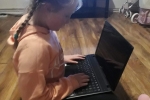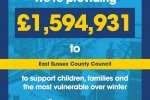National lockdown: stay at home
Coronavirus (COVID‑19) is spreading fast.
Do not leave your home unless necessary.
1 in 3 people who have the virus have no symptoms, so you could be spreading it without knowing it.
You should follow this guidance immediately. This is the law. There is additional guidance for households with a possible or confirmed coronavirus infection.
If you are clinically extremely vulnerable you are advised to follow shielding guidance. We recommend that you do not attend work, school, college or university. You should limit the time you spend outside the home. You should only go out for medical appointments, exercise or if it is essential.
Full details of what this means for you can be found on the government website at this link:
https://www.gov.uk/guidance/national-lockdown-stay-at-home
Summary of measures:
From 5 January, people will only be allowed to leave their homes for the following reasons:
- shop for basic necessities, for you or a vulnerable person.
- go to work, or provide voluntary or charitable services, if you cannot reasonably do so from home.
- exercise with your household (or support bubble) or one other person, this should be limited to once per day, and you should not travel outside your local area.
- meet your support bubble or childcare bubble where necessary, but only if you are legally permitted to form one.
- seek medical assistance or avoid injury, illness or risk of harm (including domestic abuse).
- attend education or childcare - for those eligible.
All primary schools, secondary schools and colleges will move to remote learning, except for the children of key workers and vulnerable children. While children are still very unlikely to be severely affected by COVID-19, the government recognises that schools must be included in the restrictions in order to have the best chance of getting the virus under control as schools can act as vectors of transmission, causing the virus to spread between households when rates are high.
Schools will be required to provide remote education for those learning at home.
Early years settings such as nurseries, alternative provision and special schools will remain open and vulnerable children and children of critical workers can continue to use registered childcare, childminders and other childcare activities.
The government is also advising the clinically extremely vulnerable to begin shielding again, and letters will be sent to individuals with advice on what this means for them.
All non-essential retail, hospitality and personal care services must close, or remain closed. Restaurants can continue delivery, takeaway or click-and-collect of food and non-alcoholic drinks, but venues will no longer be able to serve takeaway or click-and-collect alcohol.
Essential shops and garden centres can remain open. Entertainment venues and animal attractions such as zoos must close, but the outdoor areas of venues such as heritage homes and botanical gardens can remain open, to be used for exercise. Playgrounds may also remain open.
Places of worship can also remain open, but you may only visit with your household.
Indoor and outdoor sports facilities including sports courts, gyms, golf courses, swimming pools, and riding arenas must also close. Elite sport and disabled sport can continue, as can PE lessons for those children attending school.
Hands. Face. Space.
Approximately 1 in 3 people who have coronavirus have no symptoms and could be spreading it without realising it.
Remember - ‘Hands. Face. Space.’
- hands – wash your hands regularly and for at least 20 seconds
- face – wear a face covering in indoor settings where social distancing may be difficult, and where you will come into contact with people you do not normally meet
- space – stay 2 metres apart from people you do not live with where possible, or 1 metre with extra precautions in place (such as wearing face coverings)
You should avoid all non-essential meetings and interactions. In all circumstances, you should follow the guidance on meeting others safely.


